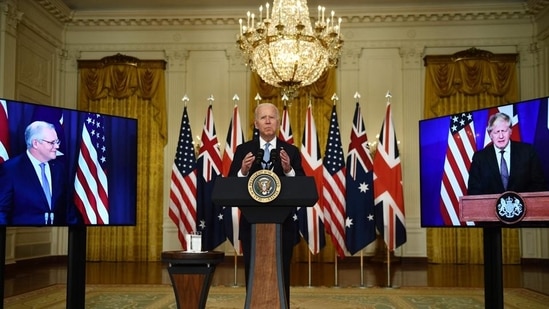AUKUS and Kunming-172: An Alert for Indonesia
The piece has been authored by Andrew W Mantong, researcher, Centre for Strategic and International Studies (CSIS), Indonesia
The recent security partnership between Australia, the United Kingdom (UK), and the United States (US), dubbed as AUKUS, has sparked various concerns in the Indo-Pacific about the future of peace and stability in the region. Despite some official releases that the move was not intended as an alignment against any particular country, a structural image arising from China vis-a-vis US competition has been all too obvious for some countries in the region, especially those of the Association of Southeast Asian Nations (Asean) like Indonesia.

Along with Malaysia, Indonesia has responded by stating that Australia should adhere to the principle of good neighbour considering its status as an Asean Dialogue Partner which required joining the Treaty of Amity and Cooperation as well as a commitment to non-proliferation principles and United Nation Convention of the Law of the Sea (UNCLOS).
Indonesia has two concerns over Australia’s move to joining AUKUS. On the first level, despite the fact that this focused only on the development of nuclear-fuelled submarines, the technology could take Australia one step closer to acquiring a full-fledged nuclear arsenal which could, in turn, go against Asean’s basic principles.
The second is related to the chain of action and reaction probably caused by the introduction of AUKUS, especially in terms of naval competition. In the same week of the announcement of AUKUS, the Chinese destroyer Kunming-172 was reported intimidating local fishermen in the North Natuna Sea, where Indonesia’s claim over its Exclusive Economic Zone (EEZ) intersects with China’s highly disputed nine-dash line claim.
Indonesia is known as a pivotal maritime state where some of the world’s most important chokepoints are located. AUKUS has targeted several initiatives extending from submarine development to cybersecurity and other advanced technology. Jakarta can easily understand the necessity of having a more robust partnership to keep any possible disruption against supply chains and physical as well as digital connectivity. However, accumulative cooperation from the US and its allies ranging from naval development to cybersecurity may further provoke China.
Indonesia is increasingly worried about a more frequent Chinese presence in its EEZ. A Chinese destroyer in the North Natuna Sea was provocative, but for Jakarta this won’t bring it closer to the US and its allies, especially given its relative naval weakness and openness of its territorial water due to the existence of major sea lines of communications (SLOCs). Instead, Jakarta worries that the region is going to witness a dramatic increase in surveillance and intelligence activities accompanying the naval presence of extra-regional powers around Indonesian waters.
Denying intervention and protecting national sovereignty is tied to a deep-seated free and inclusive foreign policy doctrine of Indonesia and other nations in Asean. In practice, the doctrine heavily informs Indonesia’s main foreign policy instrument to deal with great power politics, i.e. mainly by utilising the regional platform of Asean.
Indonesia believes that a coherent Asean will play a central role in transforming dispute into dialogue. Through series of Asean-led mechanisms such as the Asean Regional Forum, the East Asian Summit, and the Asean Defence Ministerial Meeting (ADMM) Plus including various Asean Plus forums, Jakarta hopes to dial down tensions and highlight multiple cooperative issues involving economics, the humanitarian agenda, and sustainable development. Despite limited resource, both military and economic, Indonesian diplomats firmly believe that issue-framing and agenda-setting constitute significant elements of power to influence the course of major power interactions by convening them through Asean-driven platforms.
Unity between multiple systems of government, forms of state, and socio-political cultures under Asean’s normative foundation have been consistently promoted as instrumental in ameliorating national differences and focusing on a common denominator. The absence of any armed conflict between Asean states is considered among the main modalities for Asean to practice centrality and encourage dialogue in the wider region.
Indonesia has actively promoted the idea of Asean having its own version of the Indo-Pacific discourse. Asesan has now acquired its own Asean outlook on the Indo-Pacific which portrays the region as one of cooperation and inclusion. However, the announcement of AUKUS and the presence of Kunming-172 in North Natuna Sea puts this outlook to the test. It is hard to deny that Australia decision to join AUKUS is partly related to China’s trade war in response to Canberra’s calling for Covid-19 investigation.
It is in Indonesia’s interest that Asean becomes more central in the US approach to the region. However, the announcement of AUKUS and earlier Quad suggests that Asean may be sidelined by the great powers. As the US and its allies move beyond Asean, China continues to seek bilateral ways to secure its interests, especially in the South China Sea dispute.
Having more extensive coordination with like-minded Asian states such as India, Japan and South Korea, prior to and beyond Asean meetings, may become more critical for Jakarta’s foreign policy in the near future.



